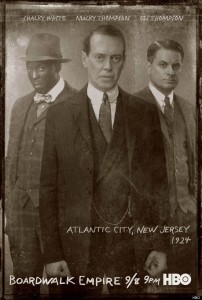By Christina Kallas
 The comparison with a novel or with watching a very long movie is a good one for yet another reason: serialization means that you cannot watch the episodes in whichever order they reach you. You have to watch the whole season as if you were watching a 12-hour movie. Terence Winter, creator of Boardwalk Empire and one of the writers for The Sopranos) talks about how the effort still goes towards ensuring that each episode may stand alone, as if it were a mini-movie. So when you just happen to watch this one it still has its own beginning, middle and end, and it makes sense. But it’s like one chapter in a book. To really appreciate it you have to watch the whole series, as you would read a book.
The comparison with a novel or with watching a very long movie is a good one for yet another reason: serialization means that you cannot watch the episodes in whichever order they reach you. You have to watch the whole season as if you were watching a 12-hour movie. Terence Winter, creator of Boardwalk Empire and one of the writers for The Sopranos) talks about how the effort still goes towards ensuring that each episode may stand alone, as if it were a mini-movie. So when you just happen to watch this one it still has its own beginning, middle and end, and it makes sense. But it’s like one chapter in a book. To really appreciate it you have to watch the whole series, as you would read a book.
Actually, it is quite intriguing to think about the effect that long cinematic narrative has on our sense of story. A movie is from its genesis a more closed form. But life is more of a long-running experience, says Terence Winter. Sometimes you meet a person and then they’re gone. It doesn’t necessarily make sense; from where you are standing you cannot understand it. But not everyone has a big impact on your immediate life. That happens with TV characters too – it doesn’t happen that much with characters in the movies.
Ultimately, part of what makes TV so compelling is its very nature as a story that never ends. There are things you can do in TV, given the logic of an ongoing series, which you cannot do in a movie. Most importantly, and that seems to be the key point of long narrative, you can take your characters to so many places that by the time you’re done, the audience has a sense of intimacy with them. They have become part of the audience’s life. TV gives you that luxury of time which movies, even the longest ones, do not. Perhaps you even reach a point where the audience simply wants to be spending time with the characters, where they and their world feel like home. On the other hand, as an audience member you are making a long-term commitment when you start watching a TV show. Ultimately TV, in its best form, cultivates an addiction. An addiction created by a big brain of collaborative writers telling a story that never ends. One could almost call it an explosion of storytelling (more of that in the next post.)
 In that context it is important to point out that, because of the internet and emerging technologies, new patterns of attention (and addiction) are arising. What looks like a transition from one era of storytelling to another is not only followed but also driven by changes in audience behavior. These new patterns are bringing up new questions: for instance, how will binge viewing change the way we structure stories? The writers of Netflix’s House of Cards approached the storytelling as a 13-hour movie – this also means less reliance on traditional end-of-episode cliff-hangers to keep audiences thinking about the story until next week’s episode. It is, however, interesting that they chose to create 13 episodes, which is the classic number of cable TV series episodes in one season.
In that context it is important to point out that, because of the internet and emerging technologies, new patterns of attention (and addiction) are arising. What looks like a transition from one era of storytelling to another is not only followed but also driven by changes in audience behavior. These new patterns are bringing up new questions: for instance, how will binge viewing change the way we structure stories? The writers of Netflix’s House of Cards approached the storytelling as a 13-hour movie – this also means less reliance on traditional end-of-episode cliff-hangers to keep audiences thinking about the story until next week’s episode. It is, however, interesting that they chose to create 13 episodes, which is the classic number of cable TV series episodes in one season.
Another interesting case of a Netflix production is Arrested Development. Its creator, Mitch Hurwitz, has written the 15 new episodes commissioned by Netflix as the same moment in time seen from a different perspective in each episode. Freed from the old concepts of attention, he originally suggested that audiences could view them in any order, but then indicated that certain jokes wouldn’t “pay off” unless you viewed the episodes in the order they were created. This is probably just the beginning of the kind of experimentation we’ll see as online platforms commission stories which are not only free from scheduled viewing but perhaps also designed around the new patterns of attention. It will be interesting to see how other patterns, such as pledging, which is connected with crowdfunding, so based on even more complex relationships between the audience and the storytellers, will eventually influence storytelling.
Next Up: Post #5: Collaborative Writing or The Explosion of Storytelling
If you are interested in reading more, including the full interviews on their process as writers with creators such as Terence Winter, Tom Fontana, Warren Leight, Robert Carlock, Janet Leahy and many more, you can purchase the book Inside the Writers’ Room. Conversations with American Writers here.
 Christina Kallas has written and produced several feature films and TV shows in Europe before she relocated to New York in 2011, where she is currently teaching at Columbia University’s and Barnard College’s Film Programs, and editing her next feature film (and her first as a director,) 42 Seconds of Happiness. She is the author of six books in her three writing languages, including the above book as well as Creative Screenwriting: Understanding Emotional Structure (London/New York, 2010). Most recently, she was honored for her outstanding contribution to the international writers’ community in her eight years of tenure as President of the Federation of Screenwriters in Europe. You can reach her at improv4writers@gmail.com and follow her on Facebook or Twitter and join the Writers Improv Studio group page for updates.
Christina Kallas has written and produced several feature films and TV shows in Europe before she relocated to New York in 2011, where she is currently teaching at Columbia University’s and Barnard College’s Film Programs, and editing her next feature film (and her first as a director,) 42 Seconds of Happiness. She is the author of six books in her three writing languages, including the above book as well as Creative Screenwriting: Understanding Emotional Structure (London/New York, 2010). Most recently, she was honored for her outstanding contribution to the international writers’ community in her eight years of tenure as President of the Federation of Screenwriters in Europe. You can reach her at improv4writers@gmail.com and follow her on Facebook or Twitter and join the Writers Improv Studio group page for updates.





